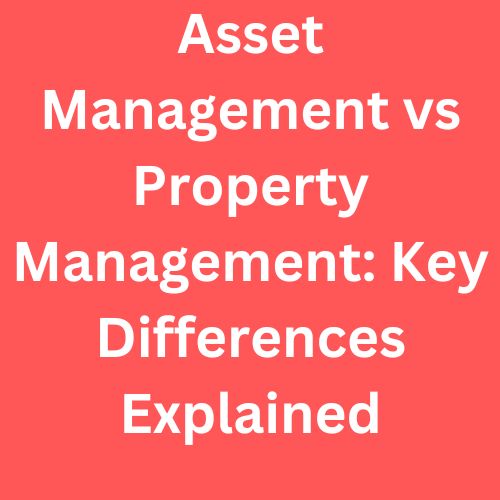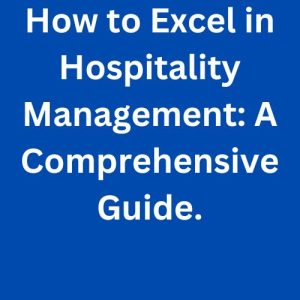
Asset Management vs Property Management
Introduction to Asset Management vs Property Management
Welcome to Hub World, we will be discussing about asset management vs property management, their definitions, key responsibilities, scope and focus of management, financial aspects and goals, technology and tools, differences in decision making authority, budgeting and financial reporting differences and integration of technology in both roles.
Defining Asset Management vs Property Management
What is Asset Management
Asset management entails management and supervision of assets using a systematic approach for assets that are immaterial and materials such as intellectual property or trademarks or patents or shares or machinery and real estate. The objective aim is congruence with strategic goals for efficient utilization to maximize profits through assets disposal or maintenance or supervision and acquisition. Associated risks are lowered, and ownership asset are improved for raising profitability or cutting costs and increasing efficiency operation.
What is Property Management
Property management entails skilled administration and supervision of property assets for profitability and increase the property value as their main objectives. Property management maintain documentation or overseeing repairs and maintenance or collecting rent or examining potential tenants and employment vacancies through advertising including fostering communication between tenants and landlords. They observe and ensures local regulations are followed or regular inspections on property and handling of tenant issues. It is essential for property management to maximize return on investment and consistent flow of income for property owners.
Key Responsibilities of Asset Management vs Property Management
Some of the key responsibilities of asset management are disposing or maintaining or acquiring and identifying assets which is required for operations including corporate resources on how well to improve and track. It involves preventive maintenance or repairs or replacements and routine inspections of assets in order to be in good conditions while assets that are not valuable or needed should be disposed. The environmental rule and regulation should be respected also sales and recycling adds value to the assets. It is crucial for the financial prosperity and ensuring the existence of the organization through the use of optimize resources.
Some of the key responsibilities of property management involves enhancements or renovations and repairs for proper maintenance and upkeep of property. They ensure potential tenants are screen and managing of lease agreements while making advertisement on available flats for rent. Transactions of real estate records are kept accurately or creating a budget and managing finances on the collection of rent or expenses incur in repairs and maintenance. They ensure property compliance and abiding to the rules and regulations of local real estate including having the essential skills and attention to details.
Scope and Focus of Management of Asset Management vs Property Management
Asset Management: Portfolio-Level Strategy
These involve achieving the investment goals through assessing a collection of assets to maximize assets management on return which is important. It facilitates risk reduction and optimize profits across multiple asset classes through diversification including asset allocation and rebalancing. Financial expansion is sustained, and the stability is achieved from a well planned strategy also risk tolerance or time horizon and objectives of the investors are considered are some of the factors for portfolio level strategy.
Property Management: Day-to-Day Operations
The potential tenants are shown the rental properties through promotion and marketing including property conducts tours and real estate listings also ensuring the standards are in good conditions for prospective renters. They ensure outstanding amounts are paid and the payment of rents are paid on time including making sure contractors works on repairs and maintenance are done on time. Tenant complaints or terminations or lease renewals are available on request and also ensuring all property are in good conditions for a profitable and smooth operation.
Differences in Decision-Making Authority on Asset Management vs Property Management
Decision-making in asset management entails allocation and management of assets with complete control which is done by the individual investors such as the asset managers or pension funds or endowments and insurance companies. The risk tolerance thresholds or investment requirements and regulatory constraints are influenced by the decisions made by individual investors. The board of trustees or investment committees collaborates with the asset managers for supervision and investment objectives. The specific circumstances and the type of investors makes decision in asset management.
Decision-making in property management entails making operational decisions or tenant selection or lease negotiations or maintenance requests and budgeting including property acquisitions or remodeling and rental rates. For the long term goals, it grants owners control over this division by keeping managers independent while decision-making may be affected by the organization composition and size. More freedom are given to managers in smaller businesses while more centralized processes occur in larger firms. To achieve the goal, effective collaboration is needed to make a powerful decision with the right allocation.
Financial Aspects and Goals on Asset Management vs Property Management
Asset Management: Maximizing ROI and Property Value
These entail maximizing the property value and the return on investment for steady income generation and value expansion. It also utilizes monitoring the market trend and making strategic planning for upkeep methods and effective remodeling cost to achieve the financial goals and the creation of long term wealth. Regularly investment portfolios are adjusted and reviewed on possibilities for high yield investment including negotiation on favorable leasing terms.
Property Management: Operational Efficiency and Tenant Satisfaction
The rent collection or repairs and managing maintenance are some of the effective operations to boost productivity and the ability to automate tasks with the use of technology. Tenant retention and problem-solving are key component of tenant satisfaction also well maintained clean and neat property and concerns and inquiries from prompt responses with tenants are two crucial elements.
Budgeting and Financial Reporting Differences on Asset Management vs Property Management
Asset management on financial reporting is referred to as the overview of the financial situation of a company and the key components of budgeting are planning for future spending and allocation of effective resources. It is essential in making strategic decisions and evaluation of financial health on budgeting and financial reporting for investors, creditors, and stakeholders. Integration is used for improving the simplification process or comprehension of asset and financial management.
Property management on budgeting is referred to as property value and maximizing the profits through allocating and organizing funds while financial reporting is referred to as the results and financial activities for updating stakeholders and documenting. Accurate reporting facilitates decision-making or analysis performance and selections of investments also these tools are essential for an effective financial management on property management.
Technology and Tools on Asset Management vs Property Management
Asset Management Software and Analytics
Asset management software and analytics is essential for the disposal to acquisition for the entire lifespan of the asset through the use of analytics for informative data on optimization or tracking and effective asset monitoring. It ensures cost saving and increase productivity through assessing assets performance or making driven data decisions and foreseeing issues. It makes sure proactive maintenance is encouraged and compliance with regulations for the maintenance of assets or operation and location from the current information provided.
Property Management Systems
Property management systems is automated and made simpler to manage tasks on property management for landlords and property managers. The property management systems are used for leases for tenants for communication or tracking maintenance or financial management and accounting to increase productivity and efficiency with the possible access to real time data. It involves managing maintenance requests or monitor spending or generating bills and collection of rent including organizing rental properties services and different range of management.
Integration of Technology in Asset Management vs Property Management
They are essential for monitoring and tracking of assets on real time data using sophisticated software systems for a thorough asset performance or schedules maintenance and financial analysis through technology powered platforms. They are used for profitability and increasing productivity using simplify operations to optimize production revenue and increase rental satisfaction for property managers and owners. It increases the operational efficiency or seamless financial transactions or streamlining lease administration and automating repair requests. The property value and the asset performance are enhanced through efficient approach or transparent or data centric for driven industry.
Conclusion
In conclusion, the long term performance or portfolio variety and risk management are used for strategic planning or disposal and asset acquisition in asset management while leasing or tenant relations and maintenance are for property management and their daily responsibilities. They are both essential for regulatory requirements or financial analysis and understanding of market trends for real estate profitability and boost performance.
READ MORE ON Asset Management vs Property Management
SEE MORE ON Difference Between Leader and Manager: Essential Characteristics

